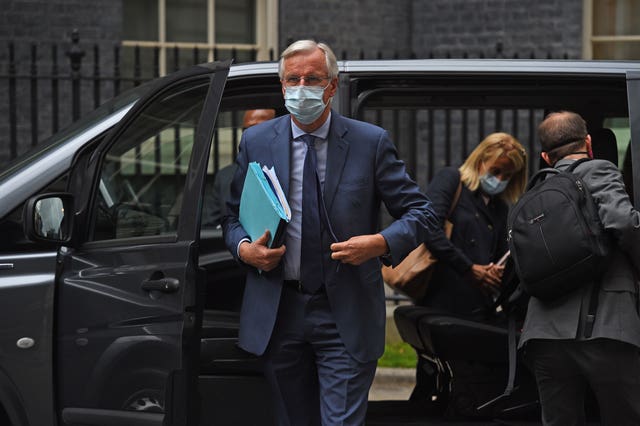The Brussels and UK chief negotiators have aired mixed messages over the likelihood of a post-Brexit trade deal following the conclusion of their latest London-round of talks. The European Union’s chief negotiator Michel Barnier said a deal looked “unlikely” and that the two sides remained at a stalemate.
The UK take
David Frost, the UK’s chief negotiator, meanwhile confirmed there was a continued impasse but struck a more hopeful tone in his media appearance following intensified discussions. He said an “agreement can still be reached in September” but called for the EU to recognise it was in discussions with an “independent state”.
Speaking at a press conference on Thursday, Barnier warned the “time for answers is quickly running out”. He also said:
By its current refusal to commit to the condition of open and fair competition, and to a balanced agreement on fisheries, the UK makes a trade agreement at this point unlikely
But a senior UK government source involved in the negotiations, when asked about Barnier’s comments, said they were a “truism” given the current situation but argued “things can move forward”.
Deadlines
The UK’s transition period for leaving the EU is due to lapse at the end of December, and both sides have said any trade deal needs to be concluded by October in order to be ratified. Frost told broadcasters that “considerable gaps remain in the most difficult areas”. But he added:
Despite all the difficulties, on the basis of the work we have done in July, my assessment is that agreement can still be reached in September, and that we should continue to negotiate with this aim in mind.
The former Foreign Office official warned, however, that without movement on the most significant issues, a no-deal scenario remained an option. He said:
We have made progress in areas like trade, trade of goods and services, transport, social security cooperation, EU programmes, participation and so on, which is good.
But nevertheless big differences do remain, in particular with the familiar questions of the… so-called level playing field and fisheries policy.
We’re in a negotiation. Either outcome is possible. We will work energetically to get a deal but it is possible we won’t reach one.

Fishing expedition
Barnier told reporters the UK’s position on fisheries was “simply unacceptable”. “The UK is effectively seeking for near-total exclusion of fishing vessels from the UK’s water”, he said.
A senior UK government source said that while the UK would have the “right to control the economic exploitation” of its fishing grounds after the transition period, talk of exclusion was incorrect. The source continued:
That doesn’t necessarily require the exclusion of EU trawlers from our waters.
What it means is an agreed abatement in which we have the right to control access to that zone – and that is what at the moment they find difficult to accept.
Until they do, it is going to be difficult to get to a fisheries agreement.
I want to reaffirm the EU's willingness to reach an ambitious and fair partnership. I continue to believe that PM @BorisJohnson & the 🇬🇧 government also want the same.
Our work continues.
My press statement following this week’s round in London 👇https://t.co/5I1SdYikVY pic.twitter.com/4e37ZKvC8G
— Michel Barnier (@MichelBarnier) July 23, 2020
Progress
Barnier also said the UK “refuses to commit to maintaining high standards in a meaningful way” and that “no progress at all” had been made on state aid.
“This is all the more worrying because we have no visibility on the UK’s intention on its future domestic subsidy control system and regime”, added the former French cabinet minister. He said the EU had engaged “sincerely” on the UK’s “red lines”, adding:
Over the past few weeks the UK has not shown the same level of engagement and readiness to find solutions respecting the EU fundamental principles and interests.
Barnier told reporters the EU and UK had until “October at the latest” to strike a deal or risk the imposition of quotas and tariffs and called for both sides to “not waste” the time left. Talks are now due to intensify over the summer, with the UK proposing to move into a “textual negotiation to get into the detail”.

















